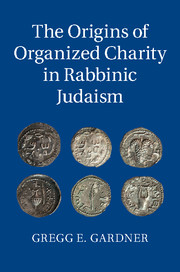Crossref Citations
This Book has been
cited by the following publications. This list is generated based on data provided by Crossref.
2015.
Books Received.
Harvard Theological Review,
Vol. 108,
Issue. 4,
p.
642.
Huebner, Sabine R.
and
Laes, Christian
2019.
The Single Life in the Roman and Later Roman World.
Miralles-Maciá, Lorena
2019.
¿Qué tipo de información transmite el Midrás sobre la sinagoga? Algunas reflexiones a partir de <em>Levítico Rabá</em>.
Sefarad,
Vol. 78,
Issue. 2,
p.
247.
Keddie, Anthony
2019.
Class and Power in Roman Palestine.
Mandsager, John
2020.
A Companion to Late Ancient Jews and Judaism.
p.
495.
Gray, Alyssa M.
2020.
A Companion to Late Ancient Jews and Judaism.
p.
217.
Howard, Peter
2020.
The Language of Dives and Lazarus: Preaching Generosity and Almsgiving in Renaissance Florence.
I Tatti Studies in the Italian Renaissance,
Vol. 23,
Issue. 1,
p.
33.
Dalton, Krista
2020.
Teaching for the Tithe: Donor Expectations and the Matrona's Tithe.
AJS Review: The Journal of the Association for Jewish Studies,
Vol. 44,
Issue. 1,
p.
49.
Ari, Nisa
2021.
European Cultural Diplomacy and Arab Christians in Palestine, 1918–1948.
p.
213.
Masters, Anne
2022.
Considering a case for rights and charity.
International Journal for the Study of the Christian Church,
Vol. 22,
Issue. 1,
p.
58.
Rus, Bogdan
2022.
Osnovne značilnosti judovske dobrodelnosti v antiki.
(Predstavitev po študijah F. M. Loewenberga in G. E. Gardnerja).
Edinost in dialog,
Vol. 77,
Issue. 1,
Halberstam, Chaya T
2024.
Trial Stories in Jewish Antiquity.
Dalton, Krista
2024.
The Palgrave Handbook of Philosophy and Money.
p.
455.
Gardner, Gregg E
2024.
Material Culture, Experimentation, and Household Lighting in Early Rabbinic Judaism.
Material Religion,
Vol. 20,
Issue. 2,
p.
176.





